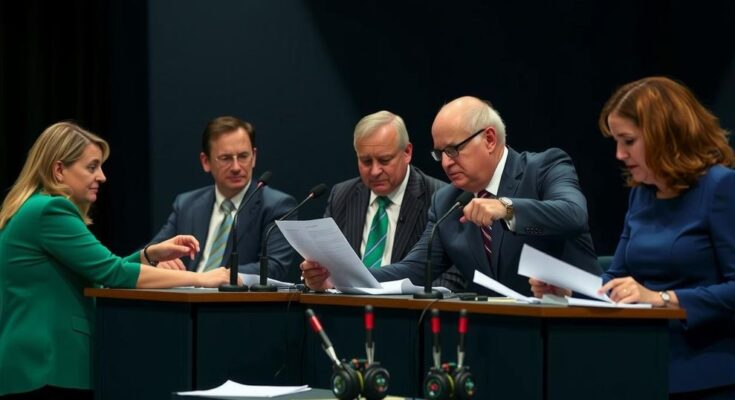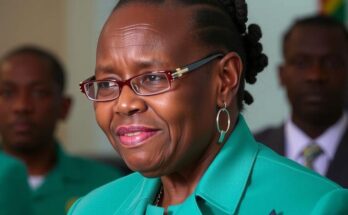Vote counting has begun in Ireland’s 2024 General Election, revealing a tight race among Fine Gael, Fianna Fail, and Sinn Fein. An exit poll suggests voter support is closely grouped, indicating potential coalition talks. Key issues such as the housing crisis and immigration dominated the campaign, setting a complex stage for the election outcome and government formation.
Vote counting commenced in Ireland’s 2024 General Election, highlighting a competitive contest among the three leading political parties: Fine Gael, Fianna Fail, and Sinn Fein. The first polling results indicate that Fine Gael garnered 21% of the voter support, closely followed by Fianna Fail at 19.5% and Sinn Fein at 21.1% as per an Ipsos B&A exit poll which surveyed over 5,000 voters. This is indicative of a potential coalition government as no single party is projected to secure an outright majority.
As ballot boxes were opened at 9 a.m. (0900 GMT), expectations rose for a lengthy process of tallying the results, possibly extending into days of negotiations for forming a new government. Voter issues prominently influenced the campaign, with the housing crisis and immigration at the forefront of discussions. This election marks a pivotal moment in Irish politics, determining if constituents will trend towards incumbents after experiences of the pandemic, economic instability, and rising living costs.
Ireland’s political landscape has historically been dominated by Fine Gael and Fianna Fail, which despite their similarities in policy, have been fierce rivals rooted in a civil war legacy from the 1920s. The 2020 election witnessed a remarkable showing for Sinn Fein, which, despite leading in popular support, was not included in the governmental formation due to its leftist affiliations and historical connections with the Irish Republican Army.
Political analysts had suggested the likelihood of another coalition between Fine Gael and Fianna Fail, though this necessitates support from smaller parties or independent candidates to secure a majority within the 174-seat Dáil Éireann. Sinn Fein’s aspirations for leadership amid these negotiations may falter as both Fine Gael and Fianna Fail have signaled reluctance to collaborate with them in the government. However, Sinn Fein representatives remain optimistic about possibly emerging as the leading party in this election, thereby potentially reshaping Ireland’s political dynamics.
The 2024 General Election in Ireland presents a critical juncture in the nation’s political history, characterized by a contest involving the three primary parties: Fine Gael, Fianna Fail, and Sinn Fein. This election follows significant socio-economic challenges, including a housing crisis and escalating costs of living which have been pivotal in shaping voter sentiment. The role of Sinn Fein, with its distinct historical context related to the Northern Ireland conflict, adds complexity to coalition negotiations, as traditional parties grapple with the possibility of aligning with a party previously excluded from power due to its controversial legacy. The election employs a unique proportional representation system, making the final outcomes and governmental formation process intricate and lengthy. As voters rank candidates by preference, the outcome of this election will not only reflect immediate public sentiment but may also set the stage for longer-term shifts in political alliances and governance structures in Ireland.
The commencement of counting votes in Ireland’s 2024 General Election indicates a potentially transformative moment for the country’s political framework. The emerging voter distribution among Fine Gael, Fianna Fail, and Sinn Fein suggests a likelihood of coalition formations, which will require negotiations among various parties, including smaller factions and independents. Given the pressing socio-economic issues faced by the electorate, the outcome of this election could potentially challenge traditional power dynamics and influence the direction of governance in Ireland moving forward.
Original Source: apnews.com




